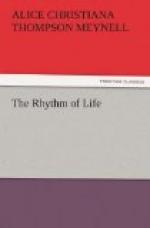Perfect personal distinctness of Experience would be in literature a delicate Innocence. Not a passage of cheapness, of greed, of assumption, of sloth, or of any such sins in the work of him whose love-poetry were thus true, and whose pudeur of personality thus simple and inviolate. This is the private man, in other words the gentleman, who will neither love nor remember in public.
PENULTIMATE CARICATURE
There has been no denunciation, and perhaps even no recognition, of a certain social immorality in the caricature of the mid-century and earlier. Literary and pictorial alike, it had for its notice the vulgarising of the married woman. No one now would read Douglas Jerrold for pleasure, but it is worth while to turn up that humourist’s serial, Mrs. Caudle’s Curtain Lectures, which were presumably considered good comic reading in the Punch of that time, and to make acquaintance with a certain ideal of the grotesque. Obviously to make a serious comment on anything which others consider or have considered humorous is to put one’s-self at a disadvantage. He who sees the joke holds himself somewhat the superior of the man who would see it, such as it is, if he thought it worth his eyesight. The last-named has to bear the least tolerable of modern reproaches; but he need not always care. Now to turn over Douglas Jerrold’s monologues is to find that people in the mid-century took their mirth principally from the life of the arriere boutique. On that shabby stage was enacted the comedy of literature. Therefore we must take something of the vulgarity of Jerrold as a circumstance of the social ranks wherein he delighted. But the essential vulgarity is that of the woman. There is in some old Punch volume a drawing by Leech—whom one is weary of hearing named the gentle, the refined—where the work of the artist has vied with the spirit of the letter-press. Douglas Jerrold treats of the woman’s jealousy, Leech of her stays. They lie on a chair by the bed, beyond description gross. And page by page the woman is derided, with an unfailing enjoyment of her foolish ugliness of person, of manners, and of language. In that time there was, moreover, one great humourist; he bore his part willingly in vulgarising the woman; and the part that fell to him was the vulgarising of the act of maternity. Woman spiteful, woman suing man at the law for evading her fatuous companionship, woman incoherent, woman abandoned without restraint to violence and temper, woman feigning sensibility—in none of these ignominies is woman so common, foul, and foolish for Dickens as she is in child-bearing.




